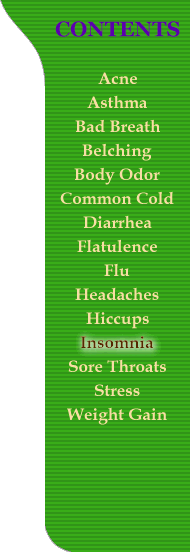|
Take a hot bath. A hot bath taken two hours before
bedtime is a wonderful way to relax your body and make it ready for sleep.
For most people, taking a bath closer to bedtime may be stimulating and
may delay sleep (of course, there are always exceptions, so be your own
guide). You make the water very hot, like a hot tub and staying in it for
at least 20 minutes. Do not bathe in very hot water, however, if you are
pregnant or have any significant health problems; ask your doctor if you
are unsure.
Establish a bedtime relaxation ritual. When parents bathe their
children or read to them every night before bedtime, they are reinforcing
a signal taht it's time to settle sown and get ready for sleep. Establishing
such a ritual may also be helpful for adults. Learn how to relax. You can
try systematic muscle-tension-and-relaxtion exercises. Drink hot milk. Try drinking warm mild or a malted-milk drink before bed. Even if it doesn't help make you drowsy, it can be comforting and certainly can't do any harm (unless you are allergic to milk or are lactose intolerant). Cut down on the time you spend in bed. Drastically curtail your time in bed, About 90 percent of sufferers stay in bed too long. The farther you spread your sleep out, the thinner it gets. If you stay in bed ten hours and you only need seven hour of sleep, you'll sleep ten hours, but it won't be very high-quality sleep. In the morning, you'll be more tired than if you only slept for seven hours.. Stay in bed two hours less than you do know. Try it for a week and see of it makes you sleep sounder and increases the restorative value of your sleep. Evaluate your medication. Certain prescription medications such as those for asthma and thyroid problems may cause insomnia. Check with your doctor if you suspect that one of your medications is causing your insomnia. Be your own sleep scientist. There is no one formula for perfect sleep. Different things work for different people. The important thing is to give everything a fair and persistent trial (for at least a week or two, not just the night) and see what works best for you. Think back to 10 or 15 years ago when you were not an insomniac. How much did you sleep then? What helped you sleep? He recommends keeping a sleep log, a notebook of what works and what doesn't work for you. Never try to go to sleep. Sounds counterintuitive, right? Well, it's not. Falling asleep is something that requires the opposite effort. Effort is work, and work keeps you awake. The harder you try to go to sleep, the harder it will be to be to sleep. Instead, simply lie still, relax and let sleep come. Stay cool. For high-quality sleep to occur, the internal body temperature should be a few degrees cooler than it is during the day. However, many insomniacs lack the proper internal controls to regulate their body temperature. That's why a hot bath helps - after raising the body's temperature, it drops it back down within a couple of hours. Exercise, done at least six hours before bedtime, has the same effect. Keeping the bedroom cooler than the rest of the house may also be helpful. Eat a sandwich. Althoughyou may have beentold that eating before you go to bed may give nightmares, the reverse is true. Going to bed on a full stomach may actually help you sleep. That may be part of the reason why folks are always nodding off after a big holiday dinner. |
 |